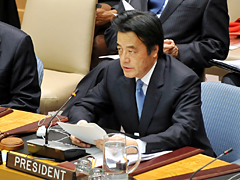Statement by H.E. Mr. Katsuya Okada
Minister for Foreign Affairs of Japan
At the Open Debate of the United Nations Security Council
on Post-Conflict Peacebuilding

April 16, 2010
Japanese
Secretary-General,
Excellencies,
Ladies and Gentlemen,
It is a great honour for me to convene an open debate of the Security Council on a very important topic, post-conflict peacebuilding. At the outset, I would like to express my sincere appreciation to the Secretary-General, His Excellency Mr. Ban Ki-moon, and to the Ministers and special guests who have traveled a great distance to share their experience and insights at this meeting.
How do conflicts recur even after a ceasefire is successfully concluded? Why does peace not take root in post-conflict countries? These are critical issues to which the international community has yet to find a definitive answer. I believe that the key to solving them is for people in the post-conflict situation to have hope for the future. To this end, how can political stability and security be achieved in parallel with social stability? How can a comprehensive peacebuilding strategy be created with the assistance of the international community? I look forward to a lively discussion on these points.
When we think about peacebuilding, we should first of all emphasize the importance of political leaders implementing a peace agreement with steadfast determination. It is also important that the fruits of democratic elections, which include political stability, be shared among all the people, including those who did not prevail, and not simply be reserved for the winners. This requires as its foundation achieving peaceful co-existence and reconciliation among parties to the conflict. In the States that comprised the former Yugoslavia, especially Bosnia and Herzegovina, which was most heavily affected by the conflict, continuous efforts have been made to this end. Afghanistan, where self-reliant efforts are being made for reconciliation and reintegration, also requires the support and cooperation of the international community.
With regard to security, peace-keeping operations have a significant role to play, and lay the ground work for promoting security sector reform. Capacity-building of the national police is an especially urgent task, for instance in Haiti and Timor-Leste. We recently lost many of our dear colleagues, including Mr. Hedi Annabi, Special Representative of the Secretary-General, in the earthquake in Haiti, and another friend, Mr. Takahisa Kawakami, in Dili last month, who, as the Deputy Special Representative of the Secretary-General in UNMIT, had not yet fulfilled his aspiration to build the national police in the young nation. I call upon the international community to continue the efforts of these dedicated UN staff by striving harder to enhance the capacity of the national police in many of the post-conflict countries.
In order to break the vicious circle of social instability and to prevent the recurrence of conflicts, it is important that conflict-affected people be provided with basic services, and thereby enjoy the peace dividend. It is essential to protect and empower individuals, including women and the vulnerable, from the viewpoint of human security. Refugees, internally displaced persons and ex-combatants must be reintegrated into society. We need to generate conditions that are conducive to making peace irreversible through promoting co-existence and reconciliation. Youth unemployment is a common issue of serious concern in many countries in the post-conflict stage. I therefore propose that, in extending assistance to such countries, high priority be attached to creation of youth employment. The youth represent the future of the country. They should not take up weapons but rather productive work, which will enable them to participate in the reconstruction of their nation and its communities. Thus, they can provide a foundation for socio-economic development, which will lead to true consolidation of peace.
Creating a long-lasting peace requires sustained cooperation between a post-conflict country and the international community. In this connection, I would like to highlight the following three points.
First, we should think about how efforts for peacebuilding can be carried out in an integrated manner. In Sierra Leone, the Peacebuilding Commission and the Government of Sierra Leone made concerted efforts to formulate a Peacebuilding Cooperation Framework, which included measures for socio-economic development such as energy assistance, together with measures for political stability and security. The international community is currently assisting the country under this framework. A framework of this kind should serve as a model for other peacebuilding strategies.
Secondly, the assistance and involvement on the part of the international community may have conflicting impact on the ownership efforts of the post-conflict country. For instance, will food assistance be conducive to promoting the efforts for domestic agricultural production? Will the pursuit of justice by the international community advance the effort for national reconciliation? Doesn't hiring of local expertise by international programs affect the efforts by the national government for capacity-building? If we overlook these issues, the fundamental goal of building self-reliance of the country will not be achieved. The international community must respect the ownership and capacity-building efforts of the post-conflict country.
Third, peacebuilding requires long-term engagement and sustainable resources. We first need to make the best possible use of funds available for the immediate aftermath of a conflict such as the Peacebuilding Fund. But such funds must be followed up by medium- and long-term resources from bilateral and multilateral programs. It is also essential to secure and strengthen necessary expertise to serve the diverse needs of peacebuilding activities, including governance and the rule of law. In this regard, we look forward to the work of the Advisory Group for International Civilian Capacities launched by the Secretary-General last month.
The Security Council must continue its strong engagement for peacebuilding, and we hope to see enhanced work by the PBC through the on-going review process. Building on today's debate, Japan will continue to participate actively in the efforts towards achieving sustainable peace in post-conflict countries.
Thank you.
Back to Index
